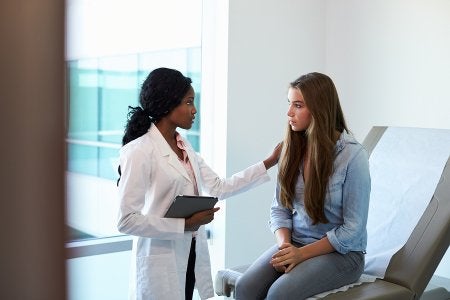-
Why Do I Have Pelvic Organ Prolapse?
Pelvic organ prolapse occurs when any of the organs in the pelvic region droop, including the vagina, uterus, bladder, rectum, and small bowel. It is a common condition that affects large numbers of women, especially after childbirth. If you think you could have pelvic organ prolapse, visit your gynecologist.

Pelvic organ prolapse occurs when pressure in the abdomen pushes on organs in the pelvic region. This pressure can occur because of pregnancy, labor, or childbirth or because of obesity. Long-term coughs, constipation, and cancers of the pelvic organs can also cause prolapse to occur. Women who have undergone hysterectomies also have a higher risk of pelvic organ prolapse.
Make an appointment with a gynecologist at Washington Surgi-Clinic if you suspect you have pelvic organ prolapse. We offer comprehensive women’s health services, including Pap smears, STD testing and treatment, pregnancy termination , and birth control method consultations. Call (202) 659-9403 to make an appointment.
-
Quick Tips for Better Gynecologic Health
When it comes to women’s health issues, knowledge is power. Never hesitate to ask your gynecologist any questions you have about your sexual health. In this video, gynecologists discuss the facts they wish their patients knew.
One topic discussed is vaginal infections, such as yeast infections. You can reduce your chances of developing a yeast infection by avoiding wearing wet, tight clothing, such as a bathing suit or workout clothes, for extended periods of time. You should also be more vigilant about yeast infections right before your period or during other times of hormonal changes.
Washington Surgi-Clinic offers comprehensive gynecology services in Washington, D.C., from advice about birth control methods to pregnancy termination. Schedule a confidential appointment today by calling (202) 659-9403.
-
Smart Strategies for Staying Comfortable During a Medical Abortion
A medical abortion involves taking two pills at home to terminate your pregnancy. They are usually recommended for pregnancies less than six weeks along according to menstrual age. Although having the abortion at home makes many women more comfortable, there are side effects to the pills. Follow this advice to manage the side effects and to stay as comfortable as possible during the abortion.
Take Pain Medicine
Because medical abortion causes cramping that can last for several hours, use an over-the-counter pain medication, such as ibuprofen, to ease your discomfort. It can help to take the pain medicine about 30 minutes before you take the second pill in the abortion procedure, since it causes the most intense cramping. Talk to your gynecologist about which pain medicine he or she recommends, but avoid taking aspirin, which will intensify your bleeding. In addition to pain medications, a heating pad or hot water bottle can also help with cramping.
Discuss Nausea Medication
Some women experience nausea and vomiting during a medical abortion. Ask your gynecologist if you should take an anti-nausea medicine to help you feel more comfortable. Although you can eat or drink as normal during the procedure, you may not feel up to it. Eating a small meal before you start taking the pills can help. During the abortion, try to drink liquids even if you can’t eat so you don’t risk dehydration. Ginger ale can help to keep you hydrated and settle your stomach.

Give Yourself Time to Rest
You will need to rest during the abortion itself, as the medications can make you feel tired. Set yourself up in a comfortable place and make sure you have things to distract you, like movies, snacks, and books. Although you can return to your normal activities the next day, you may be more comfortable if you give yourself a few days to recover.
If you’re considering abortion in Washington, D.C., Washington Surgi-Clinic can help. Visit our office to get the facts you need about your options for first and second-trimester abortions , morning after pills, and more. To make an appointment, dial (202) 659-9403.
-
How Can Gynecologists Prevent Teen Pregnancies?
Gynecologists are on the front lines of helping teens avoid pregnancy. There are many things doctors can do to help teens understand how to prevent pregnancy and what to do if they think they could be pregnant. Here are some steps that gynecologists can take to support their teenage patients and help them make the right choices about their sexual health.
Create a Safe Zone
Teens who visit the gynecologist often have concerns that they are reluctant to discuss with their parents. If a teen visits the gynecologist with a parent or guardian, allow time in the appointment for a confidential conversation directly with the teen. If a teen visits without a parent, reassure her that your discussions are completely confidential. Give teens the opportunity to talk about birth control and STD testing without any fears of parents finding out. Teens who are worried that their parents will find out if they take birth control or think they could have an STD are less likely to ask for help.

Discuss All Aspects of Sexual Activity
For teens who are sexually active, discuss ways of being intimate that don’t include a pregnancy risk and carefully review all birth control options. Remind teens that having been sexually active doesn’t mean that they need to continue to be if it doesn’t feel like the right decision. If a teen is not sexually active, highlight the advantages of delaying sex. Remind teens about the steps they should take before becoming sexually active, such as making a decision about which birth control to use.
Provide Teens with Options
Teens aren’t excluded from taking any kind of birth control because of their age, so discuss all appropriate pregnancy prevention methods with them. Make sure teens understand their options if they do become pregnant, including abortion.
At Washington Surgi-Clinic, our gynecologists provide completely confidential care to patients of all ages. Whether you think you need STD treatment or need help choosing a birth control method, make an appointment with a gynecologist in Washington, D.C . today by calling (202) 659-9403.
Recent Posts
Popular Posts
categories
- Uncategorized
- STD
- Washington Surgi-Clinic
- Abortion
- Pregnancy
- Pap Smears
- Birth Control Options
- HPV
- Gynecologist
- Pregnancy Test
- Abortion Safety
- IUD
- Pregnancy Termination
- First Trimister
- Cervical Cancer
- Morning After Pill
- Birth Control Pills
- Chlamydia
- Birth Control Shot
- Gonorrhea
- STD Testing
- Birth Control Implant
- Pelvic Pain
- Birth Control Patch
- HIV
- HPV Vaccine
